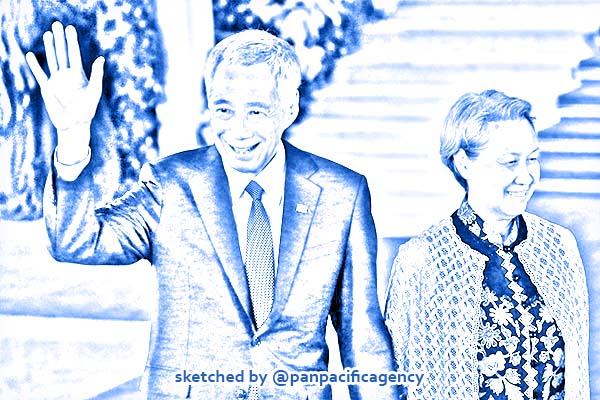Singapore PM’s wife Ho Ching responds to Bloomberg report on city state gaining from Hong Kong’s ongoing unrest

Singapore's Prime Minister Lee Hsien Loong with his wife Ho Ching in Indonesia. Ho has issued a rarely seen response to a Bloomberg article. Photo: Reuters.
SINGAPURE, Oct 27, 2019, SCMP. The Singapore prime minister’s wife Ho Ching has responded to a recent Bloomberg report suggesting the city has gained from Hong Kong’s ongoing social unrest, explaining that despite being seen as rivals, both economies served very different roles, reported the South China Morning Post.
The CEO of state investor Temasek began her more than 1,100-word Facebook post, saying: “Some folks in Hong Kong appear to have an obsession with Singapore as a ‘competitor’.”
The Bloomberg story, written by a Singapore-based correspondent covering Southeast Asia, described the city state as a “long-time rival” to Hong Kong for the title of Asia’s top financial centre.
The writer pointed to how ongoing anti-government protests in Hong Kong – triggered more than four months ago by a now-withdrawn extradition bill – had deterred visitors, while Singapore had seen an uptick in tourism, luxury home sales and currency deposits. About US$4 billion had left Hong Kong for Singapore between April and August, according to an estimate from investment bank Goldman Sachs.
“Being obsessed with the movement of some money and people to Singapore [and ignoring the movement of people and money elsewhere to the United States, Canada, Australia, United Kingdom, especially for their professional talents], just misses the point,” Ho said.
Instead, Ho said the issue for Hong Kong was its relevance to China and the world, while Singapore – anchored in Southeast Asia – should rethink its role in the region and world amid shifting tides in geopolitics and technological advancement.
Ho harked back to how Hong Kong once served as an entry point for trade with China. But as Beijing embarked on reform and economic liberalisation, the former British colony soon became a service centre for the country.
Today, Hong Kong’s gross domestic product (GDP) is about 3 per cent of China’s. Even places like the southern metropolis of Shenzhen, which borders Hong Kong and has been dubbed China’s “Silicon Valley”, has surpassed the city in terms of GDP and “density of top Chinese talent”.
Ho said some multinational companies were setting up operations in Chinese cities instead if Hong Kong, and if China continued to “loosen up” and show improved conditions for living, this would pose a real challenge to Hong Kong’s value.
Another issue that would damage Hong Kong’s role, Ho said, was if the “One Country Two Systems” governing principle – by which Beijing has ruled Hong Kong since it was handed over from the British in 1997 – did not succeed.
“Over the last 22 years, the real value of HK to China is as a demonstrator of the One China Two Systems concept, as a way to try to entice Taiwan back into her fold.
“But if this is shown not to work, then the strategic value of HK vis a vis the all important question of Taiwan for China will greatly diminish,” Ho said.
Ho wrapped up her post by urging Hongkongers to “best serve themselves by looking deep within themselves to decide what role they wish to play in and for China”.
Singapore also needed to rethink its role in the region and the world, she said, sounding a note of caution over how “forces of nature can engulf us” regardless of “political ideologies or intentions”.
Ho’s post was shared over 260 times as of Sunday morning. She actively posts articles on her Facebook page daily but comments on them less frequently.
In August, she responded to an article by local blog Seedly and defended her husband’s salary, saying Singapore’s pay system for politicians was not comparable to those of other countries.